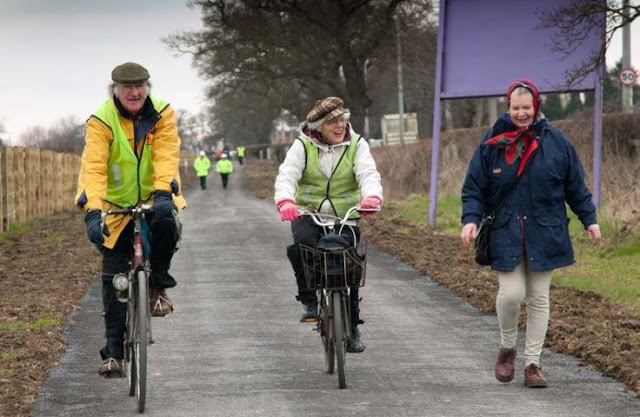Recently, another neighbor of mine lamented that the bike lane on our street--Crescent, in Astoria, Queens--is "ruining the neighborhood."
"How?" I asked.
"It used to be so easy to park here. Now it's impossible," she complained.
I didn't express that I found her cri de coeur ironic given that she doesn't drive. I believe, however, that she knew what I was thinking: "When I did drive, one of the reasons I moved here from Manhattan was so that I could have a car. So did a lot of other people."
To be fair, the reason she doesn't drive is an injury incurred in--you guessed it--a car crash. So while I conceded that some folks--like the ones who pick her up for errands and outings--need to drive, I pointed out that others could do their chores by walking or biking and their commutes on buses or trains--or bikes. "Didn't people find it harder to park as more cars came into the neighborhood."
"Yeah, but the bike lane made things worse."
In one sense, I agree with her: the bike lane was poorly-conceived and -placed. But blame for decades' worth of traffic and parking congestion on bike lanes that are only a few years old seems, to me, just a bit misplaced.
It seems that such mistaken vilification is not unique to my neighborhood or city--or to American locales in general. In the UK city of Doncaster, "cycle paths, pedestrianisation and poor bus planning" are "slowly choking our wonderful city centre." Nick Fletcher, a Tory MP, heaped on the hyperbole, begging planners to "reverse this trend" before "Doncaster becomes a ghost town."
What is the "trend" he's talking about? The one he and others claim they saw unfold in nearby Sheffield: a plan to turn downtowns into "15 minute cities," where all of the businesses and services a resident needs are within a 15 minute walk or bike ride. Fletcher and other conservative MPs see such plans the way much of today's Republican Party sees vaccination, mask-wearing during a pandemic, teaching actual history and science and shifting from fossil to sustainable fuels: as "socialist conspiracies."
 |
| Doncha' no"? They're part of a socialist conspiracy to destroy their city! |
Where I live is, in effect, a 15 minute city: Whatever one's needs, interests or preferences, they can be reached within that time frame, without a motorized vehicle. Even midtown Manhattan is reachable in that time when the trains are running on time. And in my humble judgment, Astoria is hardly a "ghost town." Nor are neighboring Long Island City, Sunnyside or Woodside--or Greenpoint in Brooklyn-- all of which are, or nearly are, 15 minute cities.
Oh, and from what I've heard and read, Sheffield and Doncaster are both "post industrial" cities in South Yorkshire. Steel is no longer made in Sheffield, once the nation's center of that industry, just as coal and mining were once, but are no longer, synonymous with Doncaster's identity. Both cities have endured losses of population that disproportionately include the young and the educated. So it seems as ludicrous to blame bike lanes and bus routes, even "poorly planned" ones, for turning those cities into "ghost towns" as it does to blame a poorly-conceived bike lane for the lack of parking in a neighborhood to which people moved from Manhattan so they could have cars.
















